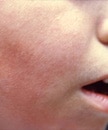Symptoms and Complications
Symptoms
About 2 out of 10 people who get infected with this virus will have no symptoms.
When symptoms of parvovirus B19 infection occur, they are usually mild and may include the following:
- Fever
- Headache
- Cough
- Sore throat
- Rashes
- Joint pain
Rashes

The most common rash associated with parvovirus B19 infection is red rash on the face, also called a “slapped cheek” rash. This rash typically appears a few days after the initial symptoms listed above. It is more common in children than adults.
If you have a Parvovirus B19 infection, you may get a second rash a few days later on your chest, back, buttocks, or arms and legs. The rash may be itchy, especially on the soles of the feet. It can vary in intensity and usually goes away in 7 to 10 days, but it can come and go for several weeks. As it starts to go away, it may look lacy.
Painful or swollen joints
If you have a Parvovirus B19 infection, you may also develop pain and swelling in your joints. This is called polyarthropathy syndrome. It is more common in adults than children, and may occur more often in women. Some adults with parvovirus B19 infection may only have painful joints, usually in the hands, feet, or knees, and no other symptoms. The joint pain usually lasts 1 to 3 weeks, but it can last for months or longer. It usually goes away without any long-term problems.
Complications
Parvovirus B19 infection is usually mild for children and adults who are otherwise healthy. However, for some people, it can cause serious health complications affecting the nerves, joints, or blood system. It has been shown to cause a severe drop in the blood count (anemia) in some patients with certain blood disorders or with a weakened immune system.
You may be at increased risk from a parvovirus B19 infection if you have one or more of these health conditions:
- Pregnancy
- Blood disorders such as sickle cell disease and thalassemia
- Weakened immune system, which could be caused by conditions including:
- Leukemia or other cancers
- Organ transplant
- HIV infection
Diagnosis
Healthcare providers can often diagnose fifth disease just by seeing a “slapped cheek” rash on a patient’s face. There is no routine laboratory test to diagnose parvovirus B19 infection. In special circumstances, your healthcare provider may test your blood for parvovirus antibodies to determine if you are susceptible or possibly immune to parvovirus B19 infection or if you were recently infected.
Because of the risks of parvovirus B19 during pregnancy, anyone who is pregnant and may have been exposed to parvovirus B19 should contact their obstetrician or healthcare provider as soon as possible.
Talk to your healthcare provider if you have any questions about whether you should get tested.